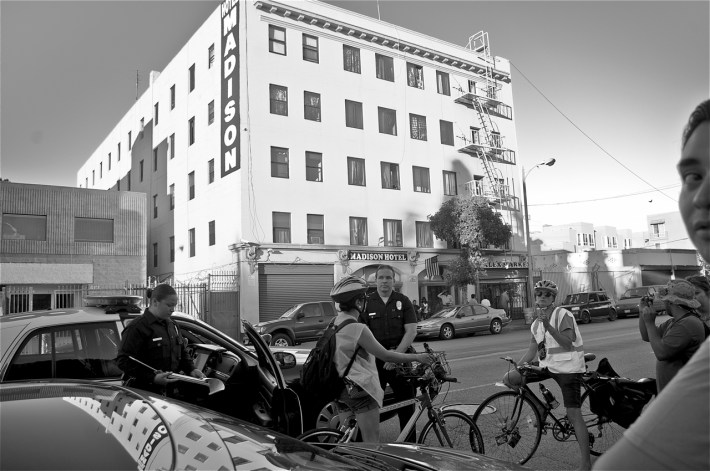
On Saturday's Clitoral Mass ride with the Ovarian Psyco-Cycles, one of the ride marshals had a run-in with the police.
I did not witness the event, but was told by multiple sources (including one of the officers) that the Ovas had blocked traffic so that riders could continue through a red light on 7th St. in the Skid Row section of downtown. When the officers moved into the intersection to stem the flow of riders, one of the marshals went around the car. She was subsequently pulled over and cited.
Witnesses felt the officers had been a little overzealous, with the female officer nearly knocking the rider over with her door, and both preferring to hand the rider a full-fledged ticket rather than the warning she asked for.
By the time I arrived a few minutes later, the female officer was already writing the ticket out.
The exchanges between the officers and the riders were calm and courteous, with the male officer freely offering his name and badge number to those who requested it and neither officer seeming to be perturbed by the fact that they were being recorded by several people with cellphones.
That doesn't mean the organizers and supporters of the ride weren't frustrated, of course.
While the officers had likely felt obligated to do something about the blocking of traffic because it happened right in front of them, they could have just given the ride marshal a warning. But they made it explicit that they were choosing not to do so in this case.
I finally approached one of the officers and asked what the solution to this kind of situation was.
When ride marshals are working to keep riders together through intersections, I argued, safety is the primary concern.
A number of the women on Saturday's ride were inexperienced and/or did not feel safe riding independently. Keeping them together helped them feel more confident and made it easier for the marshals to ensure that everyone was safe and accounted for. It also prevented dangerous situations where drivers could get between groups of riders, increasing the risk of a collision.
The officer acknowledged that the ride was well-organized and praised the group for having support cars and mechanics so people were not left to their own devices by the side of the road. But none of that meant that blocking traffic was OK.
Still pushing the safety issue, I asked about the ride I was going to go on the next day, with the East Side Riders and Los Ryderz. Those groups move through intersections like a well-oiled machine. They keep riders in one lane, keep them moving in a compact pack, and often joke and talk with drivers at intersections to explain what they are doing and build good will with the community. And because there are so few such events in South L.A. in general, the reception has been overwhelmingly positive. People honk, wave, and smile at intersections, happy to see multi-generational African-American and Latino groups from the community riding together.
Nope, still not OK, I was told.
So, I turn it over to you, dear readers.
How does your group handle intersections on larger group rides? Does it vary from ride to ride? From area of the city to area of the city? Based on the composition of the group (i.e. more families/small children)? I know that certain groups do not cork intersections as a matter of policy. How is safety managed on those rides where intersections are not corked? Which kinds of rides feel safer to you?
The officer suggested rides looking to cork intersections get a parade permit and an escort, but acknowledged that might not be the most comfortable fit for groups whose communities have not had a particularly comfortable relationship with law enforcement.
Are permits and escorts the answer? Or should we be looking at lobbying for some sort of specific exemption/permit/legislation for group rides, where groups of a certain size (say, between 30 - 200?) could block traffic, but larger rides might need an escort? Should there be requirements and/or trainings for those who seek to cork intersections so it is done safely and in a timely way (i.e. stragglers two blocks back are not holding up traffic)?
Let us know your thoughts below.





